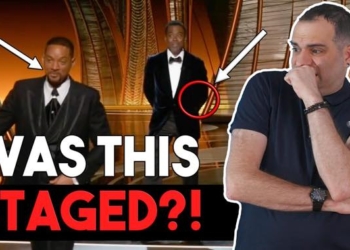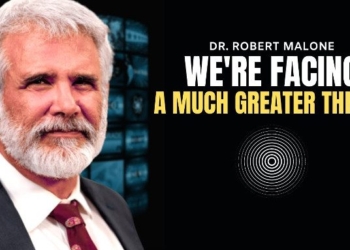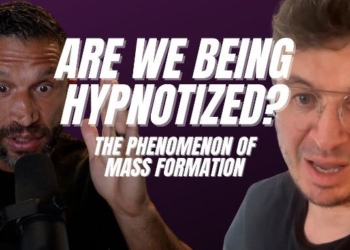
Studies show that aspects of unconscious awareness provide us with knowledge of what's about to happen, and the findings might not be what you'd expect.
You may have heard of the expression, “women's intuition,” and thus assumed that women might feel more excited than men about finding their intuitions are proven to be correct–but according to one researcher's studies, such assumptions are not necessarily true.
Dr. Julia Mossbridge's recent paper, “Predicting the Unpredictable,” delves into the fascinating realm of Predictive Anticipatory Activity (PAA). PAA is a fancy term used to describe the way researchers can record physiological evidence of a person's physiological changes–such as in the cardiopulmonary, skin, and/or nervous systems–in advance of the occurrence of a stimulus. What is being studied is thus not so much a person's conscious awareness of “knowing the future” or assertion of premonitions, so much as their unconscious physiological reactions based in the autonomic and central nervous systems.
I attended a recent Science and NonDuality (SAND) conference held in San Jose, California, in which Mossbridge showed slides depicting the way men and women react differently in such an experiment. Their task is to guess which of four pictures will be shown next, before it is randomly selected by a computer program after they have made their selection.
Mossbridge explained that when participants balked when discovering what they would be asked to do, saying something like, “I don't know what picture will be chosen next!” Mossbridge reassured them, replying, “I know! That would be weird, right? But that's what this study is about.”
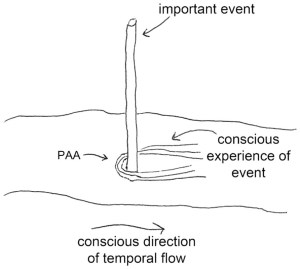
Unconsciously Sensing Future Events
The premise here is that sometimes we may unconsciously sense when a predator arrives, just before it actually approaches within striking distance. And sometimes you might get a sense that it's time to shut a computer game you're playing, just before your boss walks into your cubicle.We could benefit from clear evolutionary advantages if it's true that our unconscious physical awareness is able to pick up advance ripples of such significant future events.
We can thus ask the question if, much in the same way that we'd feel turbulence in a raft floating down a river just before we reach an obstacle in the path of the river's flow, is it possible that we can feel advance “ripples” prior to actual occurrence of significant events?
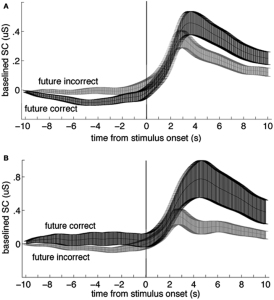
Different Patterns for Men and Women
Julia Mossbridge shared findings from a meta analysis study she conducted in 2012, “Predictive Physiological Anticipation Preceding Seemingly Unpredictable Stimuli: A Meta-Analysis.” Intriguingly, men and women's abilities to demonstrate physiological signs of advance awareness of coming events occurs in opposing patterns. Men became additionally aroused to find that somehow, their bodies “knew” what images would flash next, and demonstrated an opposite pattern from women, who were not so excited to find out they'd somehow tuned into the future. Specifically, men's responses include higher physiological arousal more consistently both before and after they find out whether or not their guess as to which of four pictures would be selected is shown to be correct. When showing undergraduate students a series of visual images in randomized order, Mossbridge noted that men and women show very different and readily distinguishable differences in galvanic skin response and heart rate before and after their non-conscious awareness indicates recognition of an image.
Are We “Conscious Puppets”?
In her talk at SAND, Mossbridge pointed out how interesting it is that we are not aware of what it is to be anything other than ourselves. This may seem to be a trivial point, but she emphasizes it is important. While we may be vaguely aware of levels of our awareness that are non-conscious, we sometimes have difficulty reconciling just how strongly the non-conscious “puppet-master” may be moving our “conscious puppet” selves.
Mossbridge pointed out that we might well wonder whether there is anything “we” can do to bridge the gap, which immediately presents us with the question, “Who is ME?” Am I the puppet? Or am I the puppetmaster? She concluded her SAND talk by saying that how you answer who you think you are answers the question about bridging the gap.
What Julia Mossbridge Knows for Sure
I was honored to meet with Julia Mossbridge and ask him what he feels he knows for sure that most people aren't aware of, that could greatly benefit the world. You can see in her response to my question in this YouTube video.





![You Will Never Lack Willpower Again! | Here’s How You Can “Surf the Urge” [8-MIN VIDEO]](https://consciouslifenews.com/wp-content/uploads/2022/11/Kelly-McGonigal-350x250.jpg)
